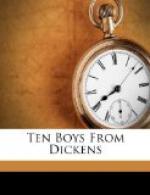In another corner, huddled together for companionship, were the little boys who had arrived on the preceding night: at no great distance from these was seated the juvenile son and heir of Mr. Squeers, Wackford by name—a striking likeness of his father—kicking, with great vigour, under the hands of Smike, who was fitting upon him a pair of new boots that bore a most suspicious resemblance to those which the least of the little boys had worn on the journey down—as the little boy himself seemed to think, for he was regarding the appropriation with a look of rueful amazement.
“Now,” said Squeers, giving the desk a great rap with his cane, which made half the little boys nearly jump out of their boots, “is that physicking over?”
“Just over,” said Mrs. Squeers, choking the last boy in her hurry, and tapping the crown of his head with the spoon to restore him. “Here, you Smike; take away now. Look sharp!”
Smike shuffled out with the basin, and Mrs. Squeers, hurried out after him into a wash-house where there were a number of little wooden bowls which were arranged upon a board. Into these bowls, Mrs. Squeers poured a brown composition, which was called porridge. A minute wedge of brown bread was inserted in each bowl, and when they had eaten their porridge by means of it, the boys ate the bread itself, and had finished their breakfast; whereupon Mr. Squeers said in a solemn voice, “For what we have received, may the Lord make us truly thankful!”—and went away to his own.
After eating his share of porridge, and having further disposed of a slice of bread and butter, allotted to him in virtue of his office, Nicholas sat himself down, to wait for school-time. He could not but observe how silent and sad the boys seemed to be. There was none of the noise and clamour of a school-room; none of its boisterous play, or hearty mirth. The only pupil who evinced the slightest tendency towards locomotion or playfulness was Master Squeers, and as his chief amusement was to tread upon the other boys’ toes in his new boots, his flow of spirits was rather disagreeable than otherwise.
After some half-hour’s delay, Mr. Squeers reappeared, and the boys took their places and their books, and ranged themselves in front of the schoolmaster’s desk.
“This is the class in English spelling, and philosophy, Nickleby,” said Squeers, beckoning Nicholas to stand beside him. “We’ll get up a Latin one, and hand that over to you. Now, then, where’s the first boy?”
“Please, sir, he’s cleaning the back parlour window,” answered one of the class.
“So he is, to be sure,” rejoined Squeers. “We go upon the practical mode of teaching, Nickleby; the regular education system. C-l-e-a-n, clean, verb active, to make bright, to scour. When the boy knows this out of book, he goes and does it. Where’s the second boy?”
“Please, sir, he’s weeding the garden,” replied a small voice.




